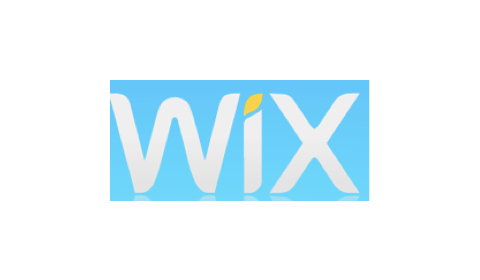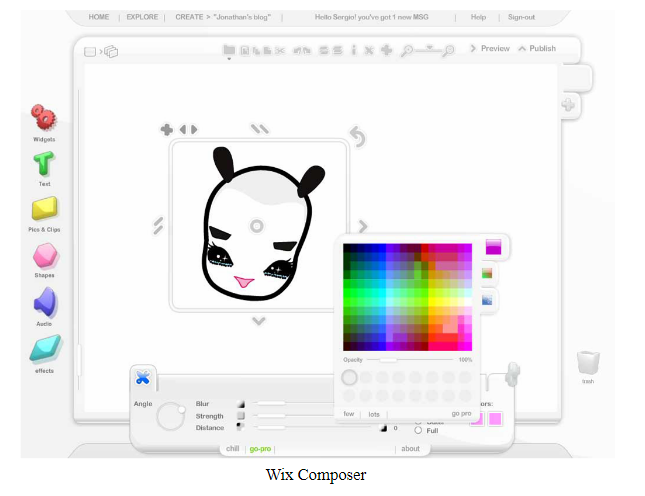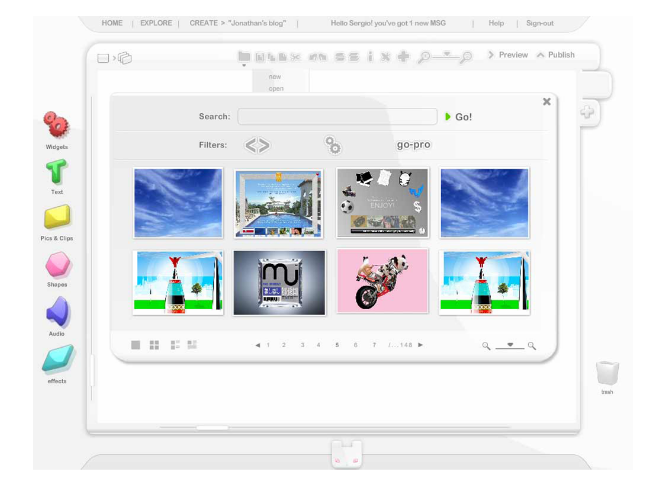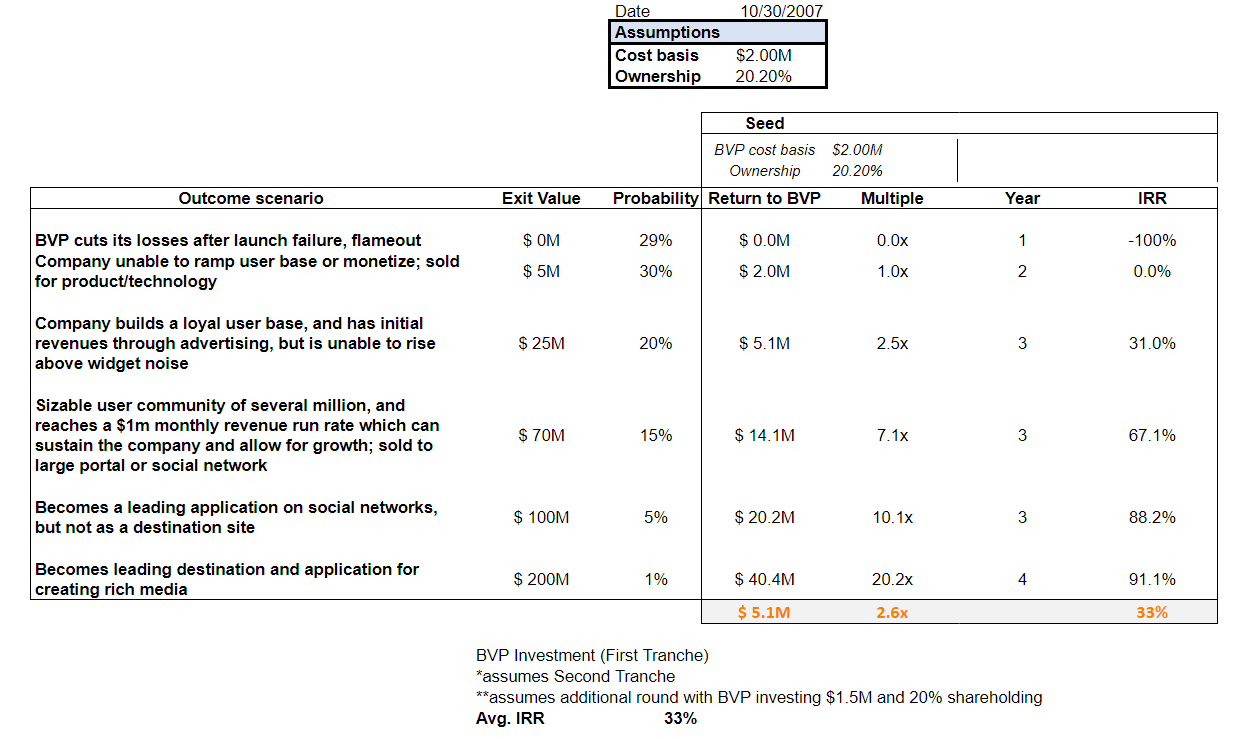Wix
From: Adam Fisher
Date: October 19, 2007
Re: Wix Seed Investment Recommendation

We recommend BVP invest $2mm in the second seed round of Wixpress Ltd., a Tel Aviv-based consumer software company that has developed an easy-to-use, rich media authoring environment for mass market users building web content such as websites and widgets. Wix addresses an acute need of consumers who wish to create professional grade rich media easily and quickly. Aimed to be as powerful as Flash, yet as easy as PowerPoint, their mission is to become the default destination and application for consumer-created rich media content. The company was incorporated in September 2006, has been working on the product for two years, and is poised to launch its product by the end of the year.
The Deal
The fully diluted pre-money valuation of the company is $7mm. The $4.1mm seed round is divided into an initial investment of $2.9mm and a warrant of $1.2mm. BVP will invest $2mm in the first tranche, and has the option of purchasing $1mm in warrants at the same price per share anytime prior to the next financing round. A group of angel investors will fill out the round, investing $900K, with a $200K warrant. BVP will own 20% after the investment and 27% after the exercise of the warrant . The initial investment will provide the company with sufficient cash through the end of 2008, and the warrant would likely provide for an additional quarter of runway. I would anticipate exercising our warrant in conjunction with a round late next year, or as a means of bridging to a round a few months later.
Summary
The Wix composer is a web-based application that allows any user to create eye-grabbing content on the web by simply dragging and dropping content. Their mission is to become the default destination and application for building rich media content on the web including widgets and websites. The product is about to enter a closed beta and we are impressed with the early version we have seen.
This is probably not the ideal time to be funding an early stage Web 2.0 company, given the proliferation of start-ups, but the versatility of the platform along with a strong product team with a marketing/distribution oriented approach is refreshing. The purchase of the three letter URL www.wix.com showed a level of foresight and thinking around search engine optimization that was new to me.
I am very excited about the prospects of the Wix product because it coincides with the rapidly emerging trend of self expression and DIY content creation. After playing with the beta, scouring the Web for hints of a similar concept, and speaking to many of you, I have come to the conclusion that Wix is both compelling and unique as an application. I am still uncertain about the precise business model, and the ability of the team to hire strong business leaders, but have enjoyed brainstorming with the founders and think they will figure it out.
Self-Expression and Personalization on the Web
Self-expression is a very strong underlying trend on the Web that is fueling the growth of many sites, including social network pages, photo sites, blogs and others. Self-expression on the Web takes on many forms, depending on the type of content and the degree of customization. Initially Internet self-expression was about self-publication in the form of blogs and personal websites and is now manifest in the form of self-promotion, as can be seen on MySpace pages. The newer form of self-expression on the Web involves rich media, as evidenced by virtual worlds, dress-up dolls, imaginary pets, and animated human avatars. While self-expression is a core feature across these various sites and communities, it is actually still very limited.
A Website Builder
One of the core use cases being discussed is to focus on a website builder for rich media content. There is no way for the average person to build a flash website today, unless you pay a Flash designer to do it or use one of several fixed template website services. Once designed, one must pay a monthly hosting fee which ranges widely from $5.95 to hundreds of dollars a month (when paying through a designer). At the same time, there are plenty of html based website building applications with varying degrees of functionality and hosting fees (including free). The website creation space is a sizeable market, evidenced by the 3.5m websites created every month. The companies in this space are private, but we have anecdotal evidence of the market size from Intuit’s acquisition of Homestead. Homestead is the 2nd largest player in terms of traffic, and was acquired by Intuit for $170m in 2007.
The thesis behind Wix is that there is a sizable user base that prefers the slick look, interactivity, and multimedia mash-up capabilities of Flash websites. In a sense, this is a market opportunity created on the one hand by MySpace users graduating to proper websites where they have full editorial and artistic control of content; and on the other hand by small businesses searching for more flexible and stylish web site designs than their uninspiring html-based site. These “small businesses” include artists, musicians, rental agencies, retail stores, design agencies, and every type of freelance of sole proprietorship job. Admittedly, Wix is still addressing MySpace users directly with their various makeover applications of a user’s profile page, but the idea is to gradually convert these users to Wix premium. Out of the 26m small businesses in the US, 10m have a MySpace profile, which clearly demonstrated their need for web presence. However, most of them can not afford building, maintaining, and promoting their own website, and Wix is trying to solve that problem.
Wix Offering
From the onset, the founders of Wix had a vision of bringing Flash-like performance and capabilities to the average user. Aside from the technical challenge, this also implied creating a user interface that is easy to start using, but difficult to master. Wix decided to emulate aspects of in the UI found in online gaming, which is also designed to enable anyone to play, but challenging enough that users would spend considerable time in order to become proficient.
- Now would be the time to look at the demo video or beta site if you haven’t already.

Once someone has played with the Wix composer, many of the diverse use cases will become obvious. Aside from a website, Wix can create a greeting card, a comment on social networks, a party invite, a promotional electronic flier, a product gallery for eBay, desktop wallpaper, a guestbook, a photo album, website, a blog, or a presentation. It is difficult to anticipate the application that will appeal most to which demographic, so Wix will track users carefully in the months after beta launch, constantly testing new formats.
In order to appeal to this mass market, Wix plans to make extensive use of templates and its library of content to guide for user to quickly create exactly what they had in mind. This is still work in progress, but Wix will essentially provide relevant content based on whether the user is creating a birthday greeting card, or wedding photo album, or MySpace layout, which are all fairly different applications. Nevertheless, users will always have the ability to create a Wix in a freestyle mode, which may prove to be the most popular.

When compared with many of the sites and applications mentioned in the previous section, one can see how Wix offers something vastly different. At least for the time being, Wix views many of these sites, as potential partners, rather than competition.
Wix Community - User Generated Components and Content
Wix is more than just an application, because it was designed as an extensible framework that is constantly improved based on user input. As a result, the Wix product has a unique angle with regards to user generated content, which creates not only a barrier to entry for competition, but makes Wix.com the primary destination for rich media content. These users include developers, graphic artists and the general population, each contributing something different, yet valuable to the Wix community.
Developers - Due to the fact that the Wix editor can work with Flash, XML and html code, anyone with basic to advanced the programming skills can upload Web components for use on Wix. This is not about creating a full Flash presentation, but rather breaking down their creations into discrete Flash components that might include animation sequences, 3D images and other rich media objects. Using Wix, developers can share their creations, track their use, and receive credit and prizes for their use and re-use by other Wix consumers. To put this into perspective, Flash developers today have no way of sharing their skill and creativity with the general population.
Wix will have to court this developer community, but since it resembles an open source approach to rich media creation, there is reason to believe it will catch on. With just a few thousand developers uploading their components, Wix will soon host an extensive library of rich media that users can browse and explore when making their Wix creations.
Artists – Similarly, graphic artists on the web number in the millions. These individuals have the artistic and creative ability, but lack the programming skills to realize many of their ideas. These artists are expected to contribute 2D graphics, images and art to the Wix community. Wix has already started several online forums where Web artists congregate and contribute their creations. Wix hopes to use such guerilla marketing tactics to bring an initial base of contributing artists very quickly. Similar to developers, artists will be rewarded for their work initially in the form of recognition and pride in seeing their work used by others (but always receiving credit). A good example of a successful site that leverages the generosity of the artistic community is Threadless.com.
Business and Revenue Model
Although the application is powerful and widely applicable, Wix will not sell or rent its software to consumers. The company feels very strongly that rapid user adoption and contribution will secure a leadership position for Wix in the area of rich media creation.
Revenue models contemplated include:
- subscription based white label Wix composers for other sites
- subscription based hosting of Wix on personal URLs (outside of mainstream sites)
- subscription based use of specialized templates for certain types of small business (the kind found on Yelp)
- subscription for using Wix to create engaging online ads (also Yelp-size clients)
Having said all this, the business and revenue models are clearly the riskiest part of the Wix proposition, and something that I am not entirely comfortable with just yet.

Technology of Wix
The corner stone of Wix framework technology is its flexibility and extensibility, relying on a new object description language called WixML. Unlike most object description languages WixML describes more than object type and position, but also behaviors, the relationship between objects, and support native object extension. As a result, it is a real framework, where 3rd party developers can use WixML to extend the framework by adding new objects, behaviors and effects. Every Wix creation is written in WixML, which is then parsed, rendered and loaded to the screen by the Wix viewer(also written in WixML). The entire Wix editor or composer is written also in WixML, but rests on a foundation layer written in Flash.
Key attributes:
- Coded in the Flash, so supported nearly any OS browser with a Flash plug-in
- Supports all forms of rich media
- Complete support for positioning, layouts, animations, interactivity and effects
- Seamless meshing of web content
- Complete supports for RSS and web services
- WixML is searchable by all search engines (unlike Flash)
- Skin-able editor (written in WixML)
- Easily extended with an SDK and an API
- Future support for multiple pages on a Wix (like flipping through a PowerPoint)
Founders and Management
The founders are technical and products visionaries, but not yet business leaders. They are very open, engaging and easy to work with. Without going into too much detail, the founders of Wix.com have diverse software backgrounds, starting as teenage computer hackers, serving in army technology units and then working and founding start-ups. For Internet entrepreneurs, they are relatively experienced, and have been involved in numerous start-ups, some of them mildly successful. Their domain expertise spans consumer and educational software, online games, and classic enterprise software. Knowing they will hire several senior people in the US (including a co-CEO, see below), the core team currently does not assign titles to themselves.
Avishai Abrahami
- Led successful startups as founder/senior manager incl. AIT, Sphera, ArelCom (sold for $30M)
- Released over 15 software products reaching millions of users * Extensive expertise in web hosting as well as technology development, sales and marketing
Giora (Gig) Kaplan
- Over 14 yrs of leading successful startups as founder and senior manager (TimeToKnow, Coolvision, Optimedia)
- Expert in internet publishing incl. release of dozens of consumer focused publications
- Extensive experience in product management and technology invention
Nadav Abrahami (younger brother of Avishai)
- Over 10 years as senior programmer and software designer incl. Eric Cohen books, Miraco, Oberon
- Developed many consumer facing software products including an adaptive framework for education titles (sold over 1 million copies)
The Wix founders claim to have 10 or so of the best Flash programmers in Israel, and recognize that they need business and marketing talent ASAP. Towards that goal, they have agreed to hire Allon Bloch as President, who will join coincident with the financing. Assuming this works out, the team has discussed him joining as co-CEO alongside Avishai. Allon is a former colleague of mine, who was already in contact with the team when we all broached the idea of him joining. He is likely to relocate to NY soon, which will work well as the company intends on establishing a strong US operation. Allon made multiple successful software investments at JVP and was at McKinsey prior to that.
Risks
Launch Fails to Generate User Growth – The biggest risk by far in investing at this stage is that is prior to the product beta and launch. We could be completely incorrect in assessing users' needs and habits, and may find that Wix is of little interest to the larger Internet community.
Competition – products from numerous Web companies make it difficult for Wix to stand out.
Business Model Stumbles – relying on an advertising model may prove difficult as users and partner sites reject advertising.. Without a revenue model, Wix will prove unviable as a company for the long-term.
Inexperienced Managemen – None of the founders have CEO experience and may end up clashing with one another over product and business direction.
Outcomes Analysis

